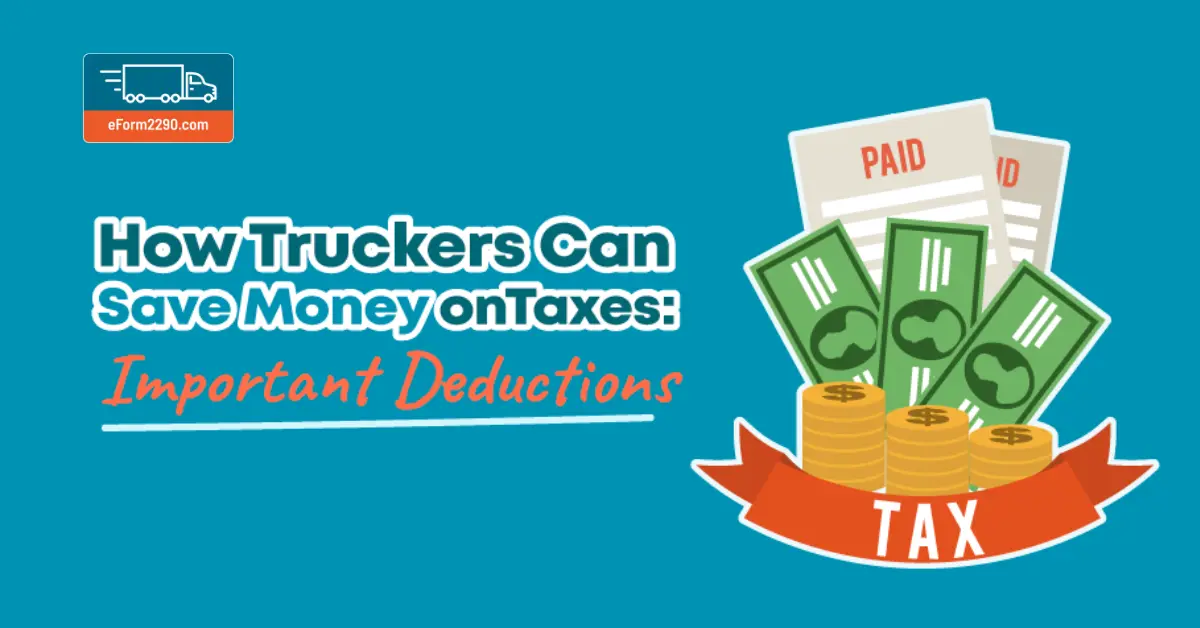How Truckers Can Save Money on Taxes: Important Deductions

If you are a trucking professional, the tax season can feel like a daunting time for you. But maximizing your truck driver tax deductions can help you save money on taxes. With this blog, we will discuss important tax deductions tailored specifically for you. Whether you're an owner-operator or fleet manager, these tips and tricks will help you save your hard-earned money.
Understanding Tax Deductions for Truckers
Before we dive further, let's grasp the fundamental concept of tax deductions. Deductions reduce your taxable income, ultimately lowering the amount you owe in taxes. As a truck driver, understanding the following deductions is important for your financial well-being:


1. Per Diem Deductions
If you are a self-employed transportation professional, then you can deduct meal expenses as per IRS regulations. In 2023, the IRS set the Per Diem rate at $69 for a full day and $51.75 for a partial day within the Continental US. While you might hear about a $55.20 rate due to temporary 100% deductions in 2021 and 2022 under the Taxpayer Certainty and Disaster Relief Act of 2020, starting in 2023, the deduction rate has reverted to 80%.
2. Home Office Deductions
If you maintain a home office for administrative tasks, you can claim a partial deduction of your rent or mortgage, utilities, and maintenance costs.
3. Truck Expenses and Depreciation
Deducting expenses related to your truck, such as fuel, maintenance, and depreciation, can substantially reduce your tax liability. Remember to keep your records to support these truck driver tax deductions.
4. Meals and Entertainment Deductions
While on the road, you can deduct 50% of your meals and entertainment expenses, provided they are directly related to your business.
5. Healthcare and Insurance Deductions
Premiums for health insurance and long-term care policies are generally deductible. Additionally, if you're self-employed, you may qualify for the self-employed health insurance deduction.
6. Retirement Contributions
Consider contributing to a tax-advantaged retirement account, such as a Simplified Employee Pension (SEP) or a Solo 401(k), to reduce your taxable income while securing your financial future.


Record-Keeping and Documentation
To successfully claim these truck driver tax deductions, meticulous record-keeping is a must. The IRS requires supporting documentation for all deductions, and in the event of an audit, you'll need to provide proof of your expenses. Here's a record-keeping checklist for you:
a) Receipts: Keep all receipts for expenses, including fuel, repairs, and meals.
b) Mileage Logs: Maintain a detailed mileage log to substantiate business-related travel.
c) Per Diem Records: If you're claiming per diem deductions, record the dates and locations of your overnight stays.
d) Bank Statements: Retain bank statements showing transactions related to your trucking business.
e) Insurance Documents: Keep copies of insurance policies and premiums paid.
f) Medical Bills: For healthcare deductions, hold onto medical bills and insurance premium receipts.
g) Retirement Account Statements: Maintain records of contributions to retirement accounts.
Tax Credits for Trucking Professionals
While deductions reduce your taxable income, tax credits directly lower your tax liability. Two key tax credits for you are:
1. Earned Income Tax Credit (EITC)
This credit is available to low-to-moderate-income individuals and families. If you qualify, it can lead to a refund.
2. Child Tax Credit
If you have qualifying children, you may be eligible for the Child Tax Credit, which can reduce your tax liability by up to $3,600 per child.
State-Specific Tax Considerations
In addition to federal taxes, you must consider state-specific tax regulations. Each state has its own tax laws, which can affect your tax liability. For example, some states have high fuel taxes, while others offer tax credits for green vehicles. Stay informed about your state's tax policies to make informed financial decisions.
Working with Tax Professionals
Navigating the complexities of specific truck driver tax deductions can be overwhelming. Many truckers find it beneficial to work with tax professionals who specialize in the industry. These experts can help you maximize your deductions, ensure compliance with tax laws, and potentially uncover additional savings opportunities.
Tax Planning and Strategies
Consider these strategies to optimize your tax planning:
1. Quarterly Estimated Payments
Make quarterly estimated tax payments to avoid penalties and stay current with your tax obligations.
2. Strategic Purchases
Budget and time out major equipment purchases to maximize depreciation deductions in the current tax year.
3. Use of Apps
Utilize tax-related apps and software to track expenses, mileage, and receipts efficiently.
Common Truck Driver Tax Deductions Mistakes to Avoid
Avoiding common tax deduction mistakes is crucial to prevent potential penalties and audits. Here are some pitfalls to steer clear of:
1. Inadequate Record-Keeping
Failing to maintain detailed records can lead to denied deductions and audits.
2. Misclassifying Expenses
Ensure that expenses are correctly categorized as business-related to avoid discrepancies.
3. Missing Deadlines
Missing tax deadlines can result in late payment penalties and interest charges.
4. Not Seeking Professional Help
Attempting to navigate complex tax laws without professional guidance can lead to missed deductions and compliance issues.
As a trucker or fleet operator, you face unique tax challenges, but with careful planning and a good understanding of deductions, you can save money on taxes while remaining compliant with IRS regulations. From per diem deductions to healthcare and retirement contributions, every dollar saved adds up. By following these insights and staying proactive with your tax planning, you can navigate tax season with ease and keep more money in your wallet.

